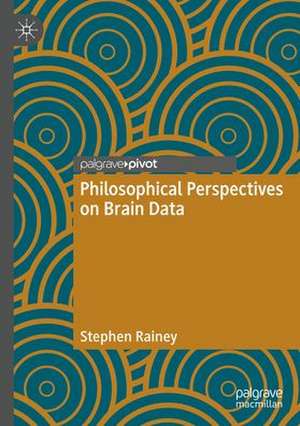Philosophical Perspectives on Brain Data
Autor Stephen Raineyen Limba Engleză Hardback – 4 mai 2023
Emerging trends in neuroscience appear to make mental activity legible, through sophisticated processing of signals recorded from the brain. This can include Artificial Intelligence (AI), with algorithms classifying brain signals for further processing. These developments will have ramifications for concepts of the brain, the self, and the mind. They will also affect clinical practices like psychiatry, by modifying concepts of mental health and introducing AI-based diagnostic and treatment strategies. The issues arising are vastly complicated, little understood, but of high importance.Philosophical Perspectives on Brain Data clarifies complex intersections of philosophical and neuroscientific interest, presenting an account of brain data that is comprehensible. This account can be the basis for evaluating practices based on brain data. As such, the book aims to open a novel space for evaluating hitherto arcane areas of academic research in order to provide the necessary scope for understanding their real-world consequences. These consequences will include personal, socio-political, and public health dimensions. It is therefore vital that they are understood if their impacts upon aspects of everyday life can be evaluated adequately.
Preț: 352.03 lei
Nou
Puncte Express: 528
Preț estimativ în valută:
67.37€ • 69.91$ • 56.31£
67.37€ • 69.91$ • 56.31£
Carte tipărită la comandă
Livrare economică 18 martie-01 aprilie
Preluare comenzi: 021 569.72.76
Specificații
ISBN-13: 9783031271694
ISBN-10: 3031271696
Ilustrații: XIV, 150 p. 3 illus.
Dimensiuni: 148 x 210 mm
Greutate: 0.35 kg
Ediția:1st ed. 2023
Editura: Springer International Publishing
Colecția Palgrave Macmillan
Locul publicării:Cham, Switzerland
ISBN-10: 3031271696
Ilustrații: XIV, 150 p. 3 illus.
Dimensiuni: 148 x 210 mm
Greutate: 0.35 kg
Ediția:1st ed. 2023
Editura: Springer International Publishing
Colecția Palgrave Macmillan
Locul publicării:Cham, Switzerland
Cuprins
Chapter 1- Introduction. - Chapter 2- Brains, Data, and Ethics. - Chapter 3 - Research Contexts - Chapter 4- Clinical Implications. - Chapter 5- Wider Markets. - Chapter 6 - Data on the Brain.
Notă biografică
Stephen Rainey is a Philosopher at Technische Universiteit, Delft, Netherlands. His recent work has focused on ethical and epistemic issues concerning brain computer interfaces, including how these impact upon identity, rationality, and control over actions.
Textul de pe ultima copertă
Where there is data there are questions of ownership, leaks, and worries about misuse. When what’s at stake is data on our brains, the stakes are high. This book brings together philosophical analysis and neuroscientific insights to develop an account of ‘brain data’: what it is, how it is used, and how we ought to take care of it.
Emerging trends in neuroscience appear to make mental activity legible, through sophisticated processing of signals recorded from the brain. This can include Artificial Intelligence (AI), with algorithms classifying brain signals for further processing. These developments will have ramifications for concepts of the brain, the self, and the mind. They will also affect clinical practices like psychiatry, by modifying concepts of mental health and introducing AI-based diagnostic and treatment strategies. The issues arising are vastly complicated, little understood, but of high importance.
Philosophical Perspectives on Brain Data clarifies complex intersections of philosophical and neuroscientific interest, presenting an account of brain data that is comprehensible. This account can be the basis for evaluating practices based on brain data. As such, the book aims to open a novel space for evaluating hitherto arcane areas of academic research in order to provide the necessary scope for understanding their real-world consequences. These consequences will include personal, socio-political, and public health dimensions. It is therefore vital that they are understood if their impacts upon aspects of everyday life can be evaluated adequately.
Stephen Rainey is a Lecturer in the Philosophy of Technology at Technische Universiteit, Delft, Netherlands. His recent work has focussed on ethical and epistemic issues concerning brain computer interfaces, including how these impact upon identity, rationality, and control over actions.
Philosophical Perspectives on Brain Data clarifies complex intersections of philosophical and neuroscientific interest, presenting an account of brain data that is comprehensible. This account can be the basis for evaluating practices based on brain data. As such, the book aims to open a novel space for evaluating hitherto arcane areas of academic research in order to provide the necessary scope for understanding their real-world consequences. These consequences will include personal, socio-political, and public health dimensions. It is therefore vital that they are understood if their impacts upon aspects of everyday life can be evaluated adequately.
Stephen Rainey is a Lecturer in the Philosophy of Technology at Technische Universiteit, Delft, Netherlands. His recent work has focussed on ethical and epistemic issues concerning brain computer interfaces, including how these impact upon identity, rationality, and control over actions.
Caracteristici
Offers novel evaluation of complex interdisciplinary academic research, in theory and in application Clarifies intersections of philosophy and neuroscience in comprehensible terms Presents a critical account of brain data, including resources for how to assess its nature and significance
